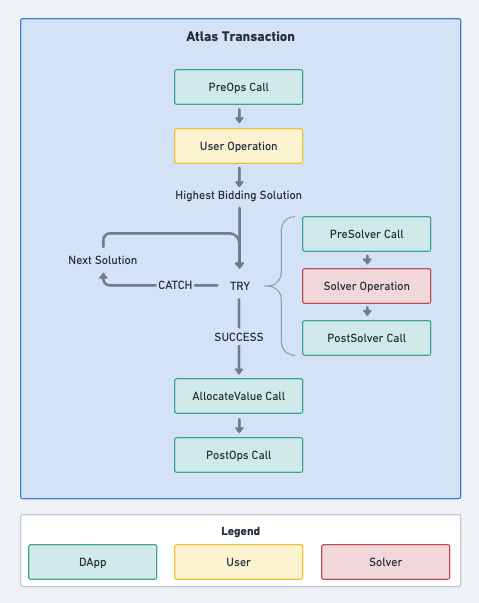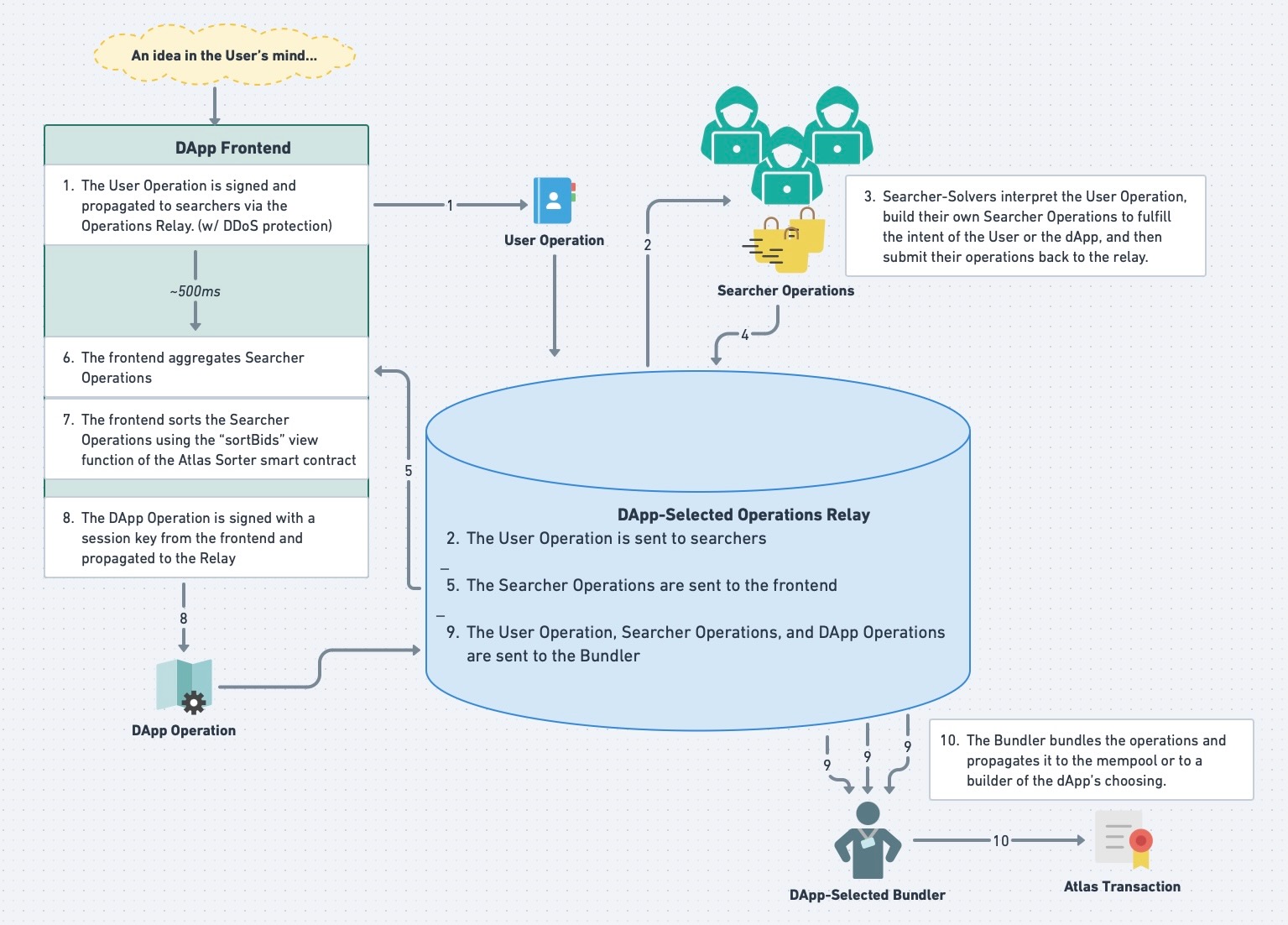This repo is still under development. No assumptions about the production implementation of Atlas should be derived from reading the current codebase; many core design elements and interfaces can -and probably will- be changed.
Atlas is a permissionless and modular smart contract framework that provides DApps with an auction system in which Solvers compete to provide optimal solutions. A User Operation is collected by the DApp's frontend via the Atlas Plugin and sent to a DApp-designated bundler, who combines it with Solver Operations into a single transaction governed by the Atlas smart contract.
A DApp wishing to participate can integrate with Atlas by completing three steps:
- Embed the Atlas API or SDK into their frontend or API.
- Create and publish a DAppControl contract.
- Interact with the Atlas contract to initialize the DAppControl contract and link it to the Atlas API on their frontend or API.
Atlas is infrastructure-agnostic; each DApp may choose how the DApp-designated bundler may aggregate the User Operations and Solver Operations. Examples include:
- On Chain: When gas cost is not an issue, the entire auction can take place on chain (or rollup).
- EIP-4337 Mempool: Once live, Operations can be distributed via this alternate mempool.
- BloXroute: When Atlas is launched, BloXroute's BDN will support the aggregation of User and Solver Operations for rapid bundling.
- SUAVE: Once live, Operations can be sent to the SUAVE network, bundled into a transaction by the SUAVE Atlas implementation, and then made available for use by builders.
Each DApp may choose a party to act as a trusted auctioneer. It is strongly recommended that the DApp select the auction beneficiary act as the auctioneer. The beneficiary can always trust themselves and this prevents adding new, trusted parties. We expect most -but not all- DApps to select the User as the auctioneer and to handle the auctioneer duties without User input through the frontend, which the User already trusts explicitly.
The auctioneer is tasked with signing a DAppOperation that includes a CallChainHash. This hash guarantees that the bundler cannot tamper with the execution order of the SolverOperations. Any party can easily generate this hash by making a view call to the getCallChainHash(SolverOperations[]) function. Note that infrastructure networks with programmable guarantees such as SUAVE will not require this as it can be handled trustlessly in-network.
Auctioneer Example:
- User connects to a DApp frontend and receives a session key from a FastLane x DApp backend.
- User signs their UserOperation, which is propagated over the bloXroute BDN to solvers.
- The frontend receives SolverOperations via the BDN.
- After a set period of time, the frontend calls the getCallChainHash() view function via the User's RPC.
- The frontend then uses the session key from step 1 to sign the DAppOperation, which includes the CallChainHash.
- The frontend then propagates the DAppOperation over the BDN to bundlers.
- Any bundler who tampers with the order of the SolverOperations will cause their transaction to revert, thereby blocking any gas reimbursement from Atlas.
Note that input from the User is only required for step 2; all other steps have no impact on UX.
The DAppControl contract is where DApps define functions that will execute at specific stages during the Atlas transaction. The contract also contains DApp-specific settings, such as the address of permitted bundlers, or if the asynchronous processing of User nonces is permitted. These functions and settings are referenced by the Atlas smart contract during execution to create a trustless environment that is maximally composable with the DApp's existing smart contracts - no upgrades or redeployments are required.
The DAppControl contract may define which entities are permitted to act as the Bundler. The DApp can designate one or more of the following:
- DAppProxy: A specific address (or addresses) is permitted to bundle operations.
- User: The User is permitted to bundle operations.
- Builder: The builder ("block.coinbase") is permitted to bundle operations.
- Solver: The top-bidding Solver is permitted to bundle the User Operation and their own Solver Operation, but may not include the Operations of other Solvers.
- Conditional: A specific function handles complex Bundler designation logic.
- Time Limit: For On Chain auctions, any party may trigger the On Chain Bundler to execute the finalized transaction, pursuant to the passing of a minimum auction duration (as specified by the DApp.)
The DAppControl contract must define the following functions:
- BidFormat: This function defines the base currency (or currencies) of the auction.
- BidValue: This function defines how to rank bids so that they may be sorted by the auctioneer.
- AllocateValue*: After a Solver's operation is executed successfully, this function is called to allocate any value that has accrued to the Execution Environment.
The DAppControl contract has the option to define functions that execute at the following stages:
- PreOps*: This function is executed before the User's operation
- PreSolver*: This function is executed after the User's operation but before a Solver's operation. It occurs inside of a try/catch; if it reverts, the current Solver's solution will fail and the next Solver's solution will begin. If the Solver's operation or the PostSolver function revert, anything accomplished by the PreSolver function will also be reverted.
- PostSolver*: This function is executed after the User's operation and after a Solver's operation. It occurs inside of a try/catch; if it reverts, the PreSolver function function, and the current Solver's operation will also be reverted and the next Solver's solution will begin.
- PostOps*: This function is executed after the successful execution of a Solver's operation and the allocation of their solution's value. If this function reverts, the User's operation will also be reverted.
*These functions are executed by the Execution Environment via "delegatecall."
A user must have an Execution Environment (EE) instance for each DApp they would like to use, and the user address is used as a salt for the create2 deterministic deployment of it. If one is not already available, EEs can be deployed during execution of a user order since their address is known beforehand, this gas cost is covered by the solver so UX is never impacted. The EE performs ops via delegateCalls, so it needs to be able to initiate token transfers from the user. Users only have to approve the Atlas contract once because Permit69 allows Atlas to transfer funds from the user if the request is from a valid EE for that user (checked by verifying the user address is one of the salts for the EE address). Permit69 is also used by DApps, but instead transfers tokens that have accumulated in the DAppControl contract, this function performs the same verification of the EE.
-
Atlas Solvers have first access to any value created by the User Operation. This exclusive access supercedes that of any wallets, RPCs, relays, builders, validators, and sequencers.
-
By acting as the Auctioneer for the Solvers and the beneficiary of any surplus value, DApp Governance bypasses the "trusted auctioneer" problem by virtue of being able to trust itself.
-
The allocation of MEV is modular and fully customizable by DApp Governance. For example, they could elect to use a portion of the MEV to refund the User's gas cost, a portion to offset the impermanent loss of the protocol's liquidity providers, and the remainder to buy that protocol's governance token for the User.
-
Due to the unique nature of the Execution Environment - a smart account that Atlas creates to facilitate a trustless environment for Users, Solvers, and DApps - Users have an extra layer of protection against allowance-based exploits.
-
DApp Governance has the option to subsidize a User's gas cost. Note that unlike traditional Account Abstraction protocols, Atlas empowers DApp Governance to subsidize the User's gas costs conditionally based on the result of the User's (or Solver's) execution. We expect that most DApps will require Solvers to subsidize all gas costs not attributed to other Solvers.
-
By putting control of any User-created value in the hands of each DApp's Governance team, and by retaining the MEV before any RPCs or private relays see the transaction, Atlas has the potential to nullify the value of private orderflow, thereby acting as a counterforce to one of the strongest centralization risks in the Ethereum ecosystem.
-
Just as in the early days of Ethereum, Solvers do not benefit from "free reverts." If a Solver Operation fails, then the Solver still must pay their gas cost to the Bundler.
-
Atlas represents a less efficient use of block space than traditional, infrastructure-based MEV capture systems. This arises due to the checks and verifications that allow Atlas to function without relying on privacy guarantees from centralized, third-party infrastructure or off-chain agreements with permissioned builders. Note that this extra usage of gas will typically be handled by Solvers, and that if no Solver is willing to pay for the increased gas cost then the User can simply do a non-Atlas transaction. In other words, the extra gas cost will only be incurred when its cost is less than its benefit.
Note that the auctioneer (typically the frontend) may want to use a reputation system for solver bids in order to not take up too much space in the block. The further down the solverOps[], the higher the reputation requirement for inclusion by the backend. This isnt necessarily required - it's not an economic issue - it's just that it's important to be a good member of the ecosystem and not waste too much precious blockspace by filling it with probabalistic solver txs that have a low success rate but a high profit-to-cost ratio.

